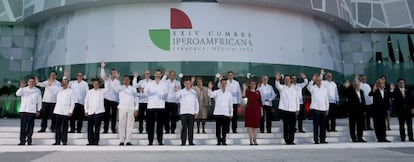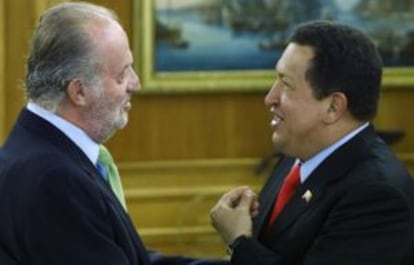Ibero-American Summit reinvents itself in a less ambitious format
Leaders leave thorny issues aside to reach deal on “soft” agenda of education and culture

The 24th Ibero-American Summit ended with some basic math. Faced with an imminent fracture within its ranks, leaders scrambled to find some common ground that would allow them to call the meeting in Veracruz, Mexico a success.
Politely avoiding ideological clashes and thorny discussions about violence or trade tariffs, gathered dignitaries instead proposed a soft agenda focusing on education, culture and innovation. And they gave themselves a comfortable two-year period to implement their own measures before meeting again in Colombia in 2016.
Gone are the days when bilateral tensions used to flare up at the Ibero-American summit — like the memorable time in 2007 when Spain’s former monarch, Juan Carlos, loudly told ex-Venezuelan president Hugo Chávez, “Why don’t you shut up?” after the latter kept trying to interrupt the Spanish prime minister’s speech.

But the playing field, now full of regional trade associations such as the Community of Latin American and Caribbean States (Celac) and the Pacific Alliance, is getting smaller year after year. What’s worse, many players are not even bothering to show up: Venezuela, Bolivia, Cuba, Nicaragua, Argentina and Brazil did not send their highest-ranking officials to Veracruz. Yet together they represent over 50 percent of Latin America’s GDP.
Bolivia’s Evo Morales called the summit, which attracted 17 heads of state this year, an “invention by the Spanish monarchs to suit their own interests.” Meanwhile, Argentinean President Cristina Fernández declined the invitation for health reasons, yet showed up to the Unasur summit in Ecuador last Friday.
The most notable absence, however, was that of Raúl Castro, whose presence had been a possibility even though Cuba has not sent a head of state to the Ibero-American Summit for the last 14 years. The Cuban government released a statement condemning “the growing global financial persecution of Cuba.”
The Spanish foreign minister, José Manuel García-Margallo, described the gathered leaders’ differences with humor.
“You cannot expect these summits to be like Whitsunday, and for the Holy Spirit to descend upon everyone and make their differences go away. I am not going to become a Bolivarian, just like [Venezuelan president Nicolás] Maduro is not going to turn into a Christian Democrat,” he said.
Faced with such a devaluation, the Ibero-American Summit is reinventing itself through biennial meetings, minimal agendas that everyone can agree on, and one featured program, called the Ibero-American Erasmus after the EU’s popular student exchange program.
This pragmatic view was summed up earlier this week in a memorable sentence by Spain’s new king, Felipe VI, who was attending his first Ibero-American Summit as head of state: “Let us go as far as it is possible to go.”
Mexican President Enrique Peña Nieto asked gathered dignitaries for “tangible results,” which have produced an alliance for the mobility of students, teachers and researchers across the territory. Scholarships will be raised to 40,000 a year from the current 10,000. There are also plans to fight illiteracy on the continent and to create a digital agenda for cultural affairs.
Tu suscripción se está usando en otro dispositivo
¿Quieres añadir otro usuario a tu suscripción?
Si continúas leyendo en este dispositivo, no se podrá leer en el otro.
FlechaTu suscripción se está usando en otro dispositivo y solo puedes acceder a EL PAÍS desde un dispositivo a la vez.
Si quieres compartir tu cuenta, cambia tu suscripción a la modalidad Premium, así podrás añadir otro usuario. Cada uno accederá con su propia cuenta de email, lo que os permitirá personalizar vuestra experiencia en EL PAÍS.
¿Tienes una suscripción de empresa? Accede aquí para contratar más cuentas.
En el caso de no saber quién está usando tu cuenta, te recomendamos cambiar tu contraseña aquí.
Si decides continuar compartiendo tu cuenta, este mensaje se mostrará en tu dispositivo y en el de la otra persona que está usando tu cuenta de forma indefinida, afectando a tu experiencia de lectura. Puedes consultar aquí los términos y condiciones de la suscripción digital.








































